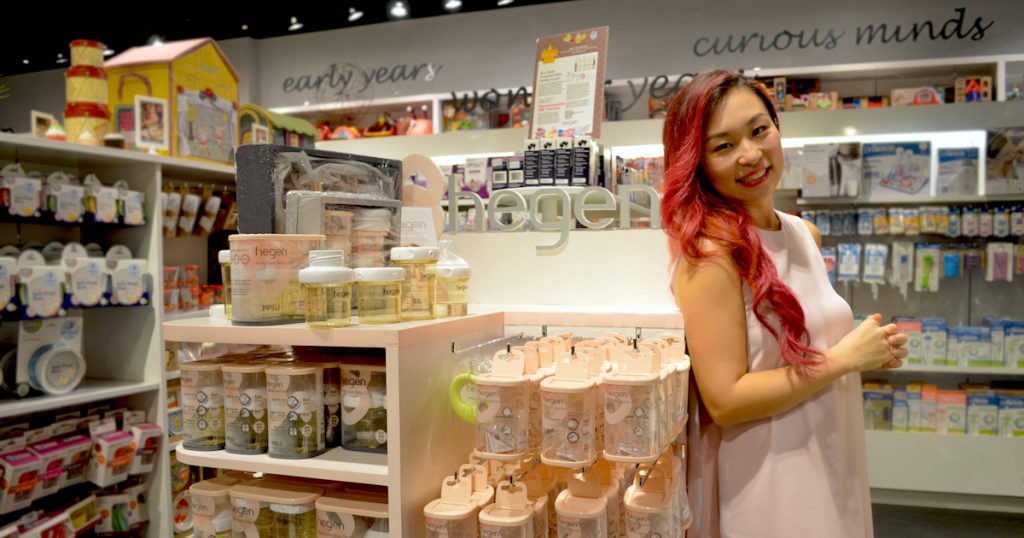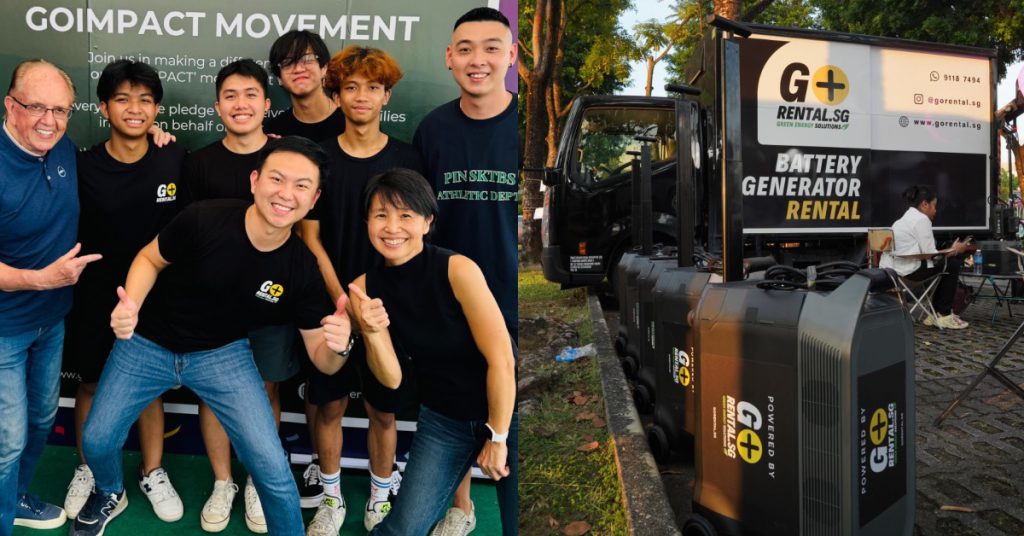As a mother of four, 38-year-old Yvon Bock has breastfed each of her children for at least a year.
Once, she even had 1,500 six oz bottles of breast milk stored in four deep freezers and six refrigerator freezer compartments.

It’s clear that this woman is passionate about breastfeeding – she would religiously express every four hours on the hour, and even organised her milk with a first-in first-out system.
Drawing from her personal experience, she knows and understands that breastfeeding is not easy; and this urged her to want to create a revolutionary baby milk bottle that will transform the baby-feeding process.
In 2015, she established Hegen under parent company Fitson Singapore, which is run by Bock’s father, Mr Chan Ching.
Tapping On The Family Business

“[My father] is a prudent businessman and our investor in the business. He manages our factory and Fitson Singapore, and has been a contract manufacturer for almost 30 years,” said Bock.
Fitson Singapore is essentially a “factory behind the scenes”, designing and manufacturing products for well-established international baby brands around the world.
However, things took a sudden turn in 2010 when a product line of their client was abruptly discontinued.
“It had only been launched 18 months ago, far from reaching the end of its product lifecycle. There were no quality issues and most importantly, we could see that it was beginning to sell well in some countries.”
They had committed huge amounts of resources, capacity, labour, and materials to meet the projected number; but there was nothing they could do.
“A decision to discontinue was made, and as a contract of manufacturer, we were somewhat helpless.”
This reality check seven years ago was what motivated them to begin their journey towards creating their own brand.
This was the first lesson I had learnt as an entrepreneur. It was time to step out of the nest and take the plunge towards doing something that we could finally call our own.
And now, Fitson Singapore is the “muscle” behind manufacturing Hegen products.
Silver Lining Behind A Leaked Design
According to Bock, a particular breastfeeding survey revealed that out of 95 per cent of mothers who initiate breastfeeding, only 21 per cent sustained this for 6 months or more.
Spurred by this finding, she wanted Hegen to make a difference and provide a sustainable breastfeeding solution for mothers all over the world.
Its design ethos is to develop simple, practical, and innovative products.

For instance, its one-hand closure Press-to-Close, Twist-to-Open (PCTO) innovation allows parents to easily press on and twist off the container’s lids, minimising spillage and unnecessary wastage of precious breastmilk.
It took them five long years – from initial design to conceptualisation – to launch their very first bottle.
It underwent several iterations, including many failed attempts and prototypes.
In fact, about a year into the initial design finalisation and just as she was about to go into the prototyping stage, Bock discovered that her design had been leaked and someone else was about to start mass producing an almost identical product.
But this setback turned out be a blessing in disguise as it forced her design team to think outside the box and do something new.
They revolutionised the conventional round bottle and came up with a unique square container that has three functions built into it.
The bottle allows mothers to “express, store and feed” using a single container by simply swapping the bottle’s feeding head, storage lid and adapter to convert a feeding bottle into a breast milk storage container or pumping container – without transferring the contents.

This minimises wastage and reduces mess, making every drop count to promote seamless and sustainable breastfeeding.
Hegen breast pump adapters, storage lids and feeding heads are also designed to fit the same bottle, which serves as a three-in-one container cum bottle.
Invested $2 Million To Support IP
Being self-funded and completely new in the market, they had to continually overcome various obstacles to get their product into the market.
This was a real test of one’s determination and perseverance to the cause. We had to invest millions before even knowing if the product works – it takes a lot of faith and belief.
But Bock was lucky to be backed by her father’s factory, which helps control the end-to-end process, ensuring that Hegen products are manufactured to the finest quality.
When Hegen launched its first product in July 2015, the interest was rather lukewarm.
But because baby products strongly depend on word-of-mouth recommendations before parents are willing to try it out, it wasn’t until a good 6 months later before the numbers started to steadily grow.

To promote the brand, every member of our Hegen team, including myself, had to personally spend time explaining our benefits to customers at consumer fairs – a tradition that is still ongoing today.
When asked about their business progress over the years, Bock said that they have yet to break even as they are continually investing in their Intellectual Property (IP) portfolio.
“All our initial earnings have been reinvested into our brand presence, expanding our IP portfolio and new range of products. We are in the midst of a five-year plan that will see us continue with this strategy until 2020.”
To date, they’ve spent approximately $2 million, out of the total $5 million investment, on their IP journey.
Since 2015, the team has grown from strength to strength – from two to 10 staff – and an expected turnover of 400 per cent by the end of 2017.

“And next year, we’re looking at four times what we made this year, so we are looking to breaking even by next year – that’s three years into the business,” said Bock.
“We are bootstrapped, self-funded, and still at our startup stages. That means we need to prioritise the things that we like to do. With every product we envision, funds will be needed to be set aside for prototyping, IP protection, mould fabrication, packaging, marketing et cetera.”
“This all takes a toll when you are still growing your brand and expanding into various markets. Prioritising can sometimes be tricky, and you may end up losing the first mover advantage.”
And as Hegen has the policy to reinvest all their earnings back into their brand or products, Bock said that they will eventually need to look into obtaining funding to support their growth.
Deflecting Copycats
According to Bock, one of the biggest challenges they’ve faced so far is IP protection as they commercialise their products globally.
So far, Bock has seen several copycats of Hegen – they produce an exact replica of their products, right down to the details on the packaging.
These copycats will usually show themselves at trade shows that they’re not in and enter lesser-known markets.
Although it’s an unethical practice, she sees the “imitation [as] a form of flattery”, especially since they are a new brand.

Any great product will inadvertently be copied, but the problem with copycats is that they are not trying to make it better – only cheaper and faster.
“Most of the time, safety is compromised and although it may look and feel like the real product, it is dangerously different when it comes to infants.”
“Therefore, IP protection to us is not for commercial gains, it is about making sure that the safety and promise of our products should never be questioned by the consumer.”
While IP protection is important, it is also an expensive and ever-increasing affair.
The time and cost involved in filing, maintaining, and updating our IP portfolio can be more than creating the product itself.
“However, we recognise the need to continue doing so and it has been a priority for us since day one. We effectively held back our overseas launch by a full year in order to ensure that our patents and design registrations were properly filed and cleared.”
In a nutshell, although IP protection is costly and time-consuming, the value it brings to both the organisation and consumers will be worth the investment.
Making A Mark On The World Map
Fast forward to today, Hegen has established itself as a reputable homegrown baby bottle maker and it’s aggressively making waves overseas.
They are currently present in 13 markets worldwide, including United States, China, Russia, United Kingdom, and Korea.

The Hegen bottle is particularly well-received in China that it was selected as the first Singapore product to be featured on Alibaba’s popular 11.11 Global Shopping Festival broadcast in November 2017.
“We are in a hyper-growth stage having seen our revenues increase with each launch in our overseas markets,” said Bock.
“We are blessed to have the support of organisations like IE Singapore who has been an integral part of our overseas growth, connecting us with potential partners and supporting us in our vision to bring Hegen to parents all over the world.”
Moving forward, Hegen looks to be in 35 overseas markets by 2020.
Next year, their main focus will be on the China, UK and US markets, as the company is in the works of increasing their presence there and growing both their online and offline retailers.
But Bock emphasised that despite their rapid expansion overseas, Singapore remains their flagship market.
However, only 30,000 babies are born here annually on average. So although Singapore is an important market, the sales percentage here cannot compare with the overseas demand.
At the end of the day, Hegen plans to stay close to the ground – where their consumers are – and carefully listen to how they can continue making a difference.
“Our distributors and retailers must continue to be our eyes and ears, but we take each and every feedback seriously. We measure our performance over our own numbers, and we determine if we have indeed grown.”
She added that being in a business family has served as an asset throughout her entrepreneurial journey as her father also doubles as her mentor.
“Starting a new business is always a risk but the entrepreneurial spirit of our family has time and again provided me with the strength and a ‘never give up’ attitude when it comes to running a business,” said Bock.
Featured Image Credit: Hegen










